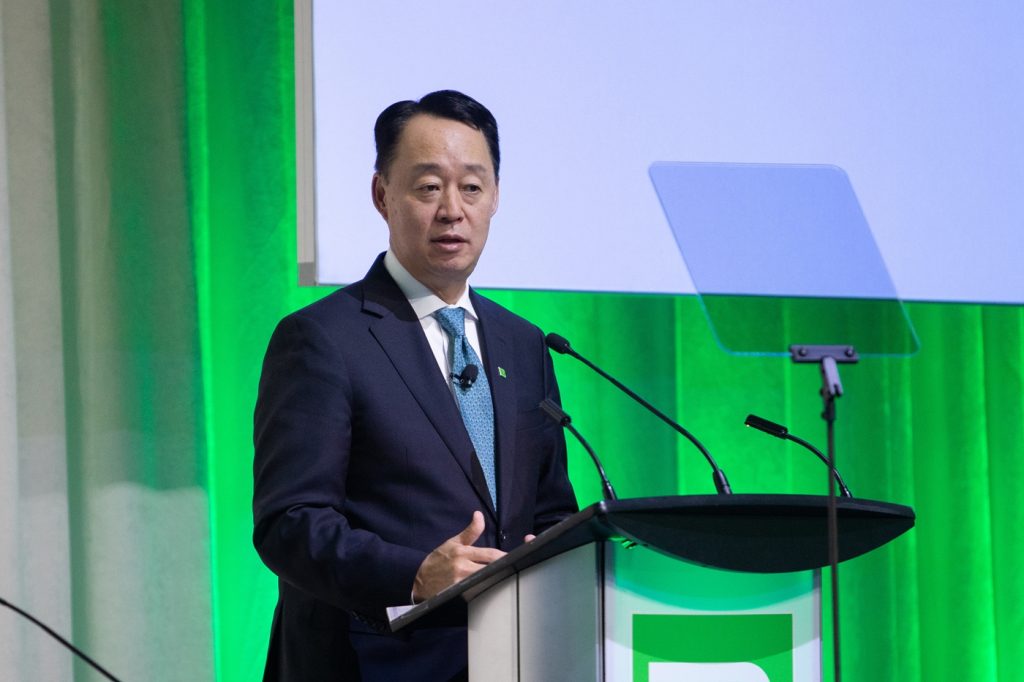By Christine Dobby
(Bloomberg) — Toronto-Dominion Bank is reinstating guidance on growth — with similar targets to those in place before a U.S. money-laundering scandal — as it pledges to slash billions in annual costs and boost revenue through a push to attract more clients and sell them additional products.
Raymond Chun, who took over as chief executive officer in February and has been leading a strategy review for the better part of a year, said the bank has a strong culture, “but there are some aspects that absolutely must change.”
“Accountability — at all levels — is non-negotiable,” he said in a speech Monday as the firm kicked off an investor day in Toronto. While Toronto-Dominion’s stock has historically outperformed its rivals, Chun said, it’s fallen behind on numerous growth metrics as well as total shareholder return. “That’s unacceptable, and that’s changing.”
Toronto-Dominion’s medium-term targets are to reach about 16% adjusted return on equity and 7% to 10% adjusted earnings per share growth by fiscal 2029, it said in an investor presentation. Those figures compare to about 13% adjusted ROE for fiscal 2026 and about 6% to 8% adjusted EPS growth for fiscal 2026.
The medium-term targets are similar to what Toronto-Dominion had in place before suspending its guidance in December in the wake of its settlement with U.S. authorities over failures to catch money laundering at several American branches. The bank paid more than $3 billion in fines and is subject to an asset cap on its U.S. retail-banking operations.
To meet its goals, Toronto-Dominion said it will dramatically reset its cost base, with plans to deliver $2 billion to $2.5 billion in annual cost savings. Some of that will come from an existing restructuring program the bank announced earlier this year.
But it’s also looking for savings in other areas across the company and said it expects to cut $500 million in yearly expenses from advances in automation and artificial intelligence. The bank also projects it will see an additional $500 million in revenue gains thanks to AI.
Toronto-Dominion’s AI goals come as institutions are starting to put hard numbers around technology investments that have so far been difficult to value. It’s a similar target to that set by rival Royal Bank of Canada at its investor day in March, when the lender said it expects to generate $700 million to $1 billion in enterprise value from AI by 2027.
On the revenue side, Toronto-Dominion has its eye on fee-generating businesses, particularly wealth management.
“We bank one out of every three Canadians,” Chun said in an interview Monday, adding that he was dismayed to see that those relationships didn’t have more depth. “We are better than the peer average, but we’re not best in class.”
Improving processes could help with this, he said, citing the example of using technology to routinely offer credit products to new immigrants who open chequing accounts. But the strategic review also highlighted the need for more “feet on the ground,” he said.
Toronto-Dominion plans to add 1,200 additional wealth-management advisers in Canada — representing an increase of about 50% from earlier this year — and 500 new retail financial advisers in the U.S., where it only has about 200. The bank is also planning to hire about 900 employees between small-business and commercial banking, Chun said.
“You’re going to see a significant investment in front-line advice capabilities across the spectrum,” he said. “If you simplify the process, you make it faster and you put more experts to deal with our clients, that will lead to tremendous organic growth as we move forward.”
Returning capital
Chun was tapped to succeed Bharat Masrani as CEO a year ago, and his appointment was accelerated after the money-laundering settlement. He officially took the top job on Feb. 1 and quickly began making changes, launching the restructuring program that will see the bank cut about 2% of its workforce and selling the firm’s stake in Charles Schwab Corp.
Toronto-Dominion said Monday it will return much of that capital to shareholders, announcing an additional buyback program of between $6 billion and $7 billion. By the end of fiscal 2026, Toronto-Dominion said, it will have returned about $15 billion in excess capital generated from the Schwab sale.
“One of the biggest changes that shareholders will see under my leadership is just the discipline that we will have around capital management,” Chun said in the interview. The bank’s first priority will be investing in its business lines, he said, followed by acquisitions — as long as they’re accretive and either add new capabilities of allow Toronto-Dominion to gain significant scale — and, finally, “consistently returning capital back to our shareholders.”
The bank has also overhauled its corporate governance at the top. Five board directors stepped down at the annual meeting in April, and Toronto-Dominion said in July that John MacIntyre, partner emeritus and co-founder of Toronto-based private equity firm Birch Hill Capital Partners Management Inc., would take over as board chair.
Toronto-Dominion’s earnings have topped analyst estimates in every quarter this year and its shares have staged a significant comeback after being battered by the money-laundering scandal. As of Monday morning, its stock was up about 43% year to date, more than double the S&P/TSX financials index, which was up roughly 19%.
©2025 Bloomberg L.P.
Visited 409 times, 409 visit(s) today
Bharat Masrani big banks investor day Raymond Chun td td bank Toronto-Dominion Bank
Last modified: September 29, 2025

